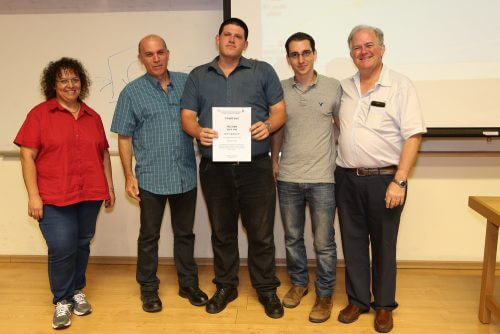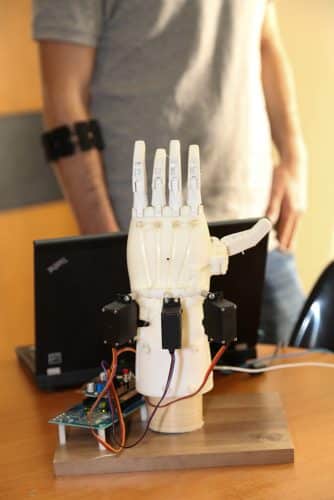The development won first place in the project competition at the Faculty of Biomedical Engineering at the Technion

A prosthetic hand operated by the user's forearm muscle - this is the invention that won first place in the student project competition held at the Faculty of Biomedical Engineering at the Technion. The hand, capable of performing six different actions such as opening a hand and boxing, was developed by the students Aviv Peleg (from the Faculty of Biomedical Engineering) and Or Dicker (from the Faculty of Electrical Engineering) under the guidance of Oscar Lichtenstein (from the Faculty of Biomedical Engineering) and Tal Schnitzer (from the Faculty of Electrical Engineering).
"The three most important factors in technological progress are people, people and people." This is what the dean of the Faculty of Biomedical Engineering Prof. Amir Landsberg said at the opening of the annual conference of student projects in the faculty, in which the competition was held. "The field of biomedicine has been characterized in recent decades by rapid growth - the fastest in the industry, in fact - and the most significant factor is human capital: people who are good at engineering, science, medicine, defining technologies and more. The training of such people is our main goal in the undergraduate studies at the faculty."
"You should know that practicing biomedical engineering involves failures and the wisdom is to get up from them, learn from them and move on," said Dr. Alex Wilensky, the project center at the faculty. "The Technion entered this field at a very early stage - the sixties - thanks to Prof. Franz Ohlendorf, a student of Albert Einstein and the founder of the Faculty of Electrical Engineering at the Technion. Ohlendorf started a course with ten students, which took a biomedical direction following world events, including the thalidomide disaster - an anti-nausea drug that caused the birth of many disabled babies. From this small course, the Department of Biomedical Engineering was born, which has since become a faculty."
Peleg and Dicker, who won first place in the student project competition at the Faculty of Biomedical Engineering and the Wilk Family Award, given at the Faculty of Electrical Engineering, explained that they took the basic product of e-enable, which is a prosthetic hand that only knows how to close the fingers in response to bending the wrist, and improved it in a way that expands the Its functionality is significantly faster and allows additional hand movements. "We added a sensor that reads the muscle movements and transmits (via Bluetooth) instructions to the system that activates the prosthetic hand. After calibration of less than a minute by the user, the product knows how to respond accurately to the instructions transmitted by the forearm muscle. Moreover, the system works in real time; The reaction time is close to the reaction time of a natural hand (250 seconds), so that the operation of the hand is intuitive and natural."

Second place in the project competition was won by the students Yair Herbst and Moran Davidi, from the Faculty of Biomedical Engineering, who also developed an improved prosthetic hand. This hand, which is characterized by high fine motor skills and allows the user to perform delicate actions such as holding a disposable plastic cup. In the world, several prosthetic hands have already been produced according to the algorithm developed by the two, and soon they will match it to 13-year-old Benjamin, a child with an amputated hand from Tekah Tikva. The third place was won by two teams: Tamara Shor and Adina Shatz, Reot Guy and Chan Avraham.
The dean of the faculty, Prof. Amir Landsberg, noted that the 13th batch of undergraduate students at the faculty has just finished its studies, and soon there will be a conference of all the graduates to which the graduates of the faculty will be invited.
